Federal Circuit Leaders Gather for Groundbreaking Symposium
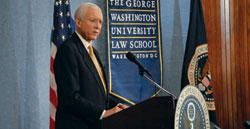
Sen. Orrin G. Hatch was the keynote for the symposium.
Claire Duggan
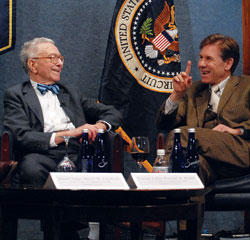
Senior Judge Daniel M. Friedman and Judge Randall R. Rader, JD ’78, U.S. Court of Appeals for the Federal Circuit, talk about the court's 1982 creation during the panel discussion “The Court—Giving Texture to the Institution of the Court.”
Claire Duggan
The National Press Club was packed on March 18 as more than 300 judges, renowned scholars, past solicitors general, and private practitioners gathered for a symposium celebrating the Federal Circuit’s first quarter century and contemplating what lies ahead.
GW Law School teamed up with the Federal Circuit Bar Association to present the full-day event, which brought together the circuit’s past, present, and future leadership. The symposium featured three panel discussions examining the institution of the court, the circuit’s complex subject matter, and scholars’ views on the Federal Circuit. Sen. Orrin G. Hatch (R-Utah) delivered the keynote address.
The first panel, focusing on the court’s history, gave texture to the Federal Circuit Court of Appeals as an institution, discussing its creation and some of the major issues it has dealt with since its establishment on Oct. 1, 1982. Formed by the merger of the Court of Customs and Patent Appeals and the Court of Claims, the U.S. Court of Appeals for the Federal Circuit casts a wide net, shouldering responsibility for complex issues ranging from intellectual property to government contracting and international trade. Panelists were a veritable “who’s who” of the circuit bench, featuring Chief Judge of the Federal Circuit Paul R. Michel, Senior Judge of the Federal Circuit Daniel M. Friedman, and Federal Circuit Judges Pauline Newman and Randall R. Rader, JD ’78. “Together, these four judges have served nearly 100 years on the bench,” says John M. Whealan, associate dean for intellectual property law studies, who moderated the discussion.
The second panel united four past solicitors general for a wide-ranging discussion on the Federal Circuit from a government perspective. Panelists, who served as solicitors general between 1997 and January 2009, included Seth P. Waxman, Theodore B. Olson, Paul D. Clement, and Gregory G. Garre, JD ’91. Carter G. Phillips, managing partner of Sidley Austin, moderated the event.
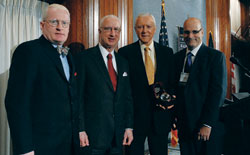
Associate Dean for IP Law John M. Whealan; U.S. Court of Appeals for the Federal Circuit Chief Judge Paul R. Michel; Sen. Orrin G. Hatch; and Federal Circuit Bar Association President Joseph R. Re.
Claire Duggan
“The level of excellence was unparalleled,” Whealan says of the panel. “Solicitors general may change, political parties may change, but all four panelists are united by excellence in legal advocacy, a strong commitment to service, and a passion for leading the court.”
The final panel of the day brought together a distinguished group of six scholars from law schools around the country for a discussion about the unique role the Federal Circuit plays in the judiciary. The panel was organized by GW Law professor John Duffy and moderated by Rochelle C. Dreyfuss, a professor at New York University School of Law.
In his keynote address, Hatch discussed the patent reform bill currently being debated in Congress and its need for passage. “It was a one-of-a-kind event,” Whealan says. “We look forward to many more collaborative endeavors with the Federal Circuit Bar Association.”
—Jamie L. Freedman
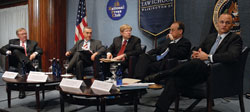
Carter G. Phillips, managing partner of Sidley Austin, moderates a panel with four recent U.S. Solicitors General: Seth P. Waxman (1997-2001); Theodore B. Olson (2001-04); Paul D. Clement (2004-08); and Gregory G. Garre, JD ’91, (2008-09).
Claire Duggan
|
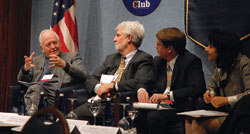
Paul D. Carrington of Duke University School of Law; Michael J. Remington, partner, Drinker Biddle & Reath; GW Law professor John F. Duffy; and Arti K. Rai of Duke University School of Law, discussed academics’ views during “The Scholars’ Comments” panel.
Claire Duggan
|
Federal Circuit Bar Journal Moves to GW Law
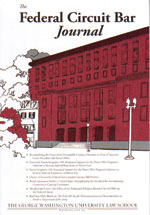 Law School rolled out the welcome mat this spring for its sixth national law journal as the Federal Circuit Bar Journal moved to its new home at the Law School. The widely-read scholarly publication, focusing on substantive and procedural law, is published quarterly and boasts a subscriber base of more than 3,000 judges, professors, attorneys, and law students.
Law School rolled out the welcome mat this spring for its sixth national law journal as the Federal Circuit Bar Journal moved to its new home at the Law School. The widely-read scholarly publication, focusing on substantive and procedural law, is published quarterly and boasts a subscriber base of more than 3,000 judges, professors, attorneys, and law students.
The official journal of the Federal Circuit Bar Association and the United States Court of Appeals for the Federal Circuit, the FCBJ provides insightful and timely coverage of myriad legal issues within the court’s purview. Articles cover a broad range of topics, spanning patent and trademark law, environmental and natural resources, government contracts, international trade, tax, and veterans’ appeals.
“The Federal Circuit Bar Journal is a perfect fit for GW since we have expertise in practically every area of the Federal Circuit’s jurisdiction,” says John Whealan, associate dean for intellectual property law studies, who oversees the journal along with Josh Schwartz, E.K. Gubin Professor of Government Contracts Law, and Steven Schooner, LLM ’89, associate professor of law. “We have one of the best IP programs and international trade programs in the country, the top government contracts program in the United States, and the only vaccine injury clinic in the nation. Many of our students go on to clerk on the Federal Circuit, as well as on the Court of Federal Claims.”
Whealan says the journal has quickly strengthened GW Law’s relationship with the Federal Circuit Bar Association, as well as with the Federal Circuit itself. “One illustration of our growing affiliation is the well-attended symposium on the circuit that we co-sponsored at the National Press Club on March 18,” Whealan says.
Students benefit in myriad ways from the collaboration, he adds. “The journal provides a diverse set of jurisdictional areas for our students to write about and provides unique opportunities for student editors to interact and network with members of the bar in their areas of subject matter interest,” Whealan says.
Dean Frederick M. Lawrence expressed great excitement over the journal’s arrival at GW Law. “The Federal Circuit is a national court with international implications based in Washington, D.C.,—just like GW Law School,” he says. “That’s why we feel a special connection to it. We are delighted that the journal is now housed at our Law School.”
Jim Brookshire, executive director of the Federal Circuit Bar Association, is equally enthusiastic about the new collaboration. “We are absolutely thrilled,” he says. “Principled scholarly discourse is at the heart of the mission of the Federal Circuit Bar Association and takes its finest point in the journal. This pairing brings together extraordinarily committed law students, outstanding academic credentials, and the association’s commitment to the U.S. Court of Appeals for the Federal Circuit and its community. The journal’s continued national leadership is thus firmly assured.”
—JLF
GW Law Students Shine in Competitions
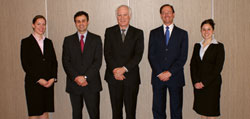
Ariel Wade and Lindsey Welsford won the Covington & Burling International Commercial Arbitration Finals. (From left) Lindsey Welsford, Miguel Lopez Forastier of Covington & Burling, O. Thomas Johnson Jr. of Covington & Burling, Allan B. Moore of Covington & Burling, and Ariel Wade
In national and international competitions, GW Law students show off their extraordinary legal minds. Here are some of the impressive competition successes of the 2008-09 academic year:
- Victoria Silver and Katie Stevens Wechsler won the ABA Region 3 Client Counseling Competition in February. As a result, they were invited to the national championship, which was held in March at North Carolina Central University, where Silver and Wechsler placed second. The duo was coached by Brianna Carbonneau, 3L, the Alternative Dispute Resolution Board president and a past winner of this competition.
- John Katsos, David Myers, Matthew Orlins, and Dawna Steelman won the ABA Quinnipiac University School of Law Criminal Justice Trial Advocacy Competition. The team had two coaches taken from GW’s adjunct professor ranks: Niranjali “Nira” Amerasinghe, assistant coach, and Mark Shaffer, head coach. The competition was held at the Federal Courthouse in New Haven, Conn., and at the Quinnipiac University Law School. As the winner, GW advanced to the 19th Annual National Criminal Justice Student Trial Advocacy Competition at the John Marshall Law School in Chicago.
- Jacob Schroeder won $10,000 for finishing first in the Axinn Challenge Antitrust Brief Writing and Oral Argument Competition, sponsored by the law firm of Axinn, Veltrop & Harkrider. This competition invited upper-level law students to take on an antitrust writing assignment akin to those completed by young associates. Writers of the top four brief entries were flown to New York City to compete in an oral advocacy competition judged by antitrust practitioners.
- Christopher Agrawal and Joe Edell were finalists in the Northeast Regional of the Giles Rich Intellectual Property National Moot Court Competition in Boston. As a result, they were invited to the national competition as one of the top eight teams in the country. John Whealan, associate dean for intellectual property, was their coach.
- Brianna Carbonneau and Andrea Stagg reached the semifinals of the Frankfurt International Investment Arbitration Moot. After the general rounds, GW Law defeated University of Quito Law from Ecuador in the quarterfinals, but GW Law’s run ended in the semis against Hong Kong. Adjunct professor Allan Moore of the Washington, D.C., office of Covington & Burling coached the team in Frankfurt, while adjunct professor Jonathan Gimblett, an associate at Covington and former member of the British Diplomatic Service, coached the students in the states. David Johnson, senior assistant dean for student affairs and director of advocacy programs, also coached the team.
- Jeremy Glen and Michael Rhoads were finalists in the New York City Bar’s Region 3 Moot Court Competition. As a result, they advanced to the New York City Bar’s National Moot Court Competition. About 130 teams started out in this competition, and GW Law reached the top 28 teams in the nation.
- The team of Hina Hussain, Fabio Leonardi, Jingting Li, and Paul Kraczek reached the semifinals of the North American rounds of the World Trade Organization Law Moot Court Competition, sponsored by the European Law Students Association. Hussain was awarded 2nd Best Orator of the preliminary rounds, and Leonardi earned the award for 3rd Best Orator of the preliminary rounds.
- Adam Alba and Cynthia Andrus reached the semifinals of the 2009 National Religious Freedom Moot Court. The finals were held before Mark Chopko, chair, nonprofit & religious organizations, Stradley Ronon Stevens & Young; Barry Lynn, executive director, Americans United for Separation of Church and State; and Eric Treene, special counsel for religious discrimination, U.S. Department of Justice, Civil Rights Division.
- Lindsay Bourne, Michael Rhoads, Susan Simpson, and Michael Williams reached the quarterfinals of the 2009 Philip C. Jessup International Law U.S. Mid-Atlantic Super Regional Moot Court Competition, which GW Law hosted. They were coached by Susan Karamanian, associate dean for international and comparative legal studies.
- Kelly Dunn, Casey Groher, Courtney Hague, and Dan Kapner represented GW Law in the Vis International Commercial Arbitration Competition in Austria. They received honorable mentions for both their claimant and respondent memoranda. Only about 20 teams out of 240 received recognition for either, and only a few teams received recognition for both. Miguel López Forastier, an associate from Covington & Burling who coached the team, played a large part in their success. Additionally, Groher received an honorable mention for Best Oralist. Faris Ghareeb, JD ’08, also coached the team.
- The first ever Covington & Burling International Commercial Arbitration Finals occurred in March. Tom Johnson and Allan Moore, who co‑chair Covington’s arbitration practice group, and Miguel López Forastier, a Covington associate and coach of GW’s Vis International Arbitration team, served as arbitrators. Last September, Moore contacted GW Law to get more involved with the skills boards. He was impressed after judging the semifinals of GW Law’s International Commercial Arbitration Competition last spring. Since then, Covington has become sponsor of the competition. Ariel Wade and Lindsey Welsford won and will represent GW in next year’s Willem Vis International Commercial Arbitration Competition abroad.
Domestic Violence Project Earns Leadership Award
For the past six years, the Domestic Violence Legal Empowerment and Appeals Project has provided leadership in helping victims of domestic abuse gain footing in appeals of unsuccessful court cases. In March, the organization’s efforts were recognized with a Washington Area Women’s Foundation 2009 Leadership Award and a $10,000 grant for outstanding legal work on behalf of domestic violence victims in the Washington, D.C., area.
“It’s really wonderful to be recognized by this high-powered network of women activists and committed professionals and donors,” says Joan Meier, executive director of DV LEAP. The leadership award acknowledges local nonprofits demonstrating innovation or measurable success in their service of women and girls.
DV LEAP, a partnership of GW Law School and a large network of law firms providing pro bono representation, is the only organization in the nation specializing in expert appellate legal representation for domestic violence victims who would otherwise be unable to seek justice in appellate courts. The project was founded in 2003 in response to an urgent need for expert appellate litigation to reverse unjust trial court rulings and to protect the legal rights of women and children victimized by family violence. This year’s award is the fourth in a series of national and local recognitions won by DV LEAP, and it comes at an advantageous time, Meier says.
“All small nonprofits right now are struggling for funds,” she says, adding that donor giving across the community has declined. “So this helps us weather the economic downturn, enabling us to keep doing the important work we do.”
That important work is to provide a stronger voice for justice by fighting to overturn unjust trial court outcomes, advance legal protections for domestic violence victims and their children through expert appellate advocacy, train lawyers, psychologists, and judges on best practices, and spearhead domestic violence litigation in the U.S. Supreme Court.
In addition to Meier and staff attorney Elizabeth Liu, DV LEAP has more than 30 attorneys who provide pro bono representation on cases. Since its founding in 2003, the project has filed briefs for more than 19 cases, some on behalf of the party, and some amicus briefs. DV LEAP lawyers have provided in-depth consulting on hundreds more cases.
DV LEAP has had a number of significant victories in the D.C. Court of Appeals, including a case mandating children’s safety as the first priority in deciding parents’ visitation rights, and a case affirming the right of victims to enforce their own protection orders, among other critical issues.
In addition to providing appellate litigation in state courts, DV LEAP promotes local and national law reform, provides intensive consultations to lawyers and parties in domestic violence litigation, and teaches others about appellate advocacy and cutting edge domestic violence issues.
“We do presentations and trainings all over the country,” Meier says.
This kind of far-reaching, important work has earned the organization its most recent award and its recognition as a leader in domestic violence and women and children’s legal issues.
“We’re well known in the field of custody, and we’re among a handful of people in the country leading the work on custody and abuse—most domestic violence lawyers and many non-lawyers know of us,” Meier says. And that’s how their clients find them. “Word of mouth is extraordinary.”
—Carrie Madren
Community Matters
The weather for this year’s Dean’s Jeans Day barbecue was unseasonably cool, but that didn’t stop GW Law faculty members, students, and staff members from gathering at University Yard for food and fun on April 7.
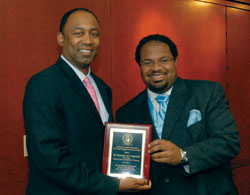
Christian Washington, JD ’09, (right) presents Hon. Lee F. Satterfield, JD ’83, with this year’s Harris Alumni Award at the 31st annual banquet hosted by the Black Law Student Association.
Claire Duggan
Patricia Roberts Harris Alumni Award
D.C. Superior Court Chief Judge Lee F. Satterfield, JD ’83, received the 2009 Patricia Roberts Harris Alumni Award. Satterfield was honored for his distinguished legal career, including more than 16 years on the bench at the Superior Court of the District of Columbia. He was appointed chief judge last fall.
Friedman Fellows Immerse in Clinics
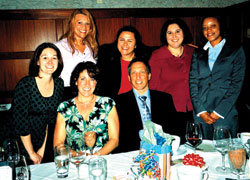
Friedman Fellows Kelly Knepper, Amanda Spratley, Juliana Russo, Anastasia Boutsis, and Jenelle Williams with benefactor Philip Friedman and his wife, Lisa
Young lawyers have a new gateway to enter into public interest careers. As a GW Law Friedman Fellow, professionals gain hands-on experience while practicing their legal work under the supervisory wings of experienced faculty members.
The two-year graduate clinical fellowship is a new program operating at the Jacob Burns Community Legal Clinics. Friedman Fellows gain teaching and lawyering experience while taking classes as graduate law students, writing a graduate thesis, and working toward an LLM degree. Every fellowship is connected to one of the Law School’s 11 clinics. Although the clinics are varied in nature, each allows the fellow to co-teach and co-supervise alongside clinical faculty.
“In clinics, law students shoulder the weight of responsibility for other people’s lives, so they need individual attention and instruction. One reason why it is so helpful to have a clinical fellowship program is that the fellows help the faculty teach law students about how to work effectively as lawyers,” says Associate Dean Phyllis Goldfarb, who oversees the program. “In the process, the fellows learn so much, not only about lawyering but about teaching as well.”
The fellowship is funded through a $2 million endowment by Philip Friedman, a Washington, D.C., attorney who donated the money to the clinics following a large class action lawsuit.
“He wanted the money made available for the benefit of people who need legal assistance but can’t afford it,” Goldfarb says. Friedman contacted then-Associate Dean Carol Izumi about making the donation. When Goldfarb followed Izumi as associate dean, part of her job was to determine the best use of the hefty donation.
Friedman Fellow Amanda Spratley, JD ’08, says she enjoyed working in a clinic during law school and knew that a fellowship there would boost her experience.
“I could be close to clients, get a feel for what they’re going through, understand what the clients’ needs are, and help law students to understand them,” she says. “It was a dynamic lawyering experience rather than one removed from clients and depending mostly on doing basic research.”
Spratley, who is a fellow with the Small Business and Community Economic Development Clinic, works with law students on cases ranging from helping entrepreneurs decide what kind of entity to form, to assisting business owners with regulatory compliance, contract drafting or review, and trademark and copyright assistance.
Each fellow’s experience is slightly different, Spratley explains. Included in most fellows’ time are co-teaching and co-supervising, meeting with students, planning for seminar classes, working on the clinic’s case docket, and handling some administrative details of the clinic. At the same time, Spratley is taking classes and working on a thesis that relates to her clinical work. Among its many virtues, the fellowship creates an opportunity for scholarly writing supported by the GW Law faculty.
Fellowships kick off with an orientation to clinical teaching, followed by two year-long courses in clinical teaching and scholarship, designed and taught by Goldfarb, to anchor the clinic experience.
“My courses meet throughout the fellowship, to add breadth and depth, and to help the fellows put their clinic experience in a broader context,” Goldfarb says. For their work, fellows receive an annual stipend between $40,000 and $50,000, tuition remission for the LLM program, health insurance and other benefits, and possible student loan deferment.
The first class of Friedman Fellows, made up of five young lawyers, began their two-year fellowships in fall 2008. Two
additional fellows, the class of 2009-11, arrive in August. As the program takes off, faculty members aim to make it attractive to brilliant young legal minds from around the country.
“We’re hoping it’s a program of national scope,” Goldfarb says, “that will have a broad reach and a broad impact, and that will attract highly talented people for years to come.”
—CM
Katz Intellectual Property Law Speaker Series
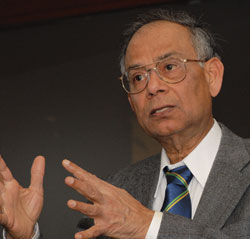
Claire Duggan
On April 16, Ananda M. Chakrabarty discussed his involvement in the landmark Supreme Court case Diamond v. Chakrabarty. His talk focused on how the case affected his role in intellectual property and his current research on promiscuous anticancer, anti-HIV/AIDS drug development. About 100 people attended the lecture and reception, including sponsor A. Sidney Katz, JD ’66.
Buergenthal and Shestack Receive 2008 Gruber Justice Prize
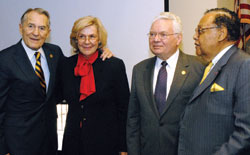
(From left) 2008 Gruber Justice Prize winner Jerome J. Shestack, Gruber Foundation co-founder and President Patricia Gruber, Gruber Justice Prize winner Judge Thomas Buergenthal, and civil rights pioneer and former U.S. Department of Transportation Secretary William T. Coleman Jr.
Last fall, GW Law helped honor two giants of international justice and law as the Peter and Patricia Gruber Foundation awarded its 2008 Justice Prize to GW Law Professor Emeritus and International Court of Justice Judge Thomas Buergenthal and former American Bar Association President Jerome J. Shestack.
“Through a lifetime of dedication and determination to the principles of equal rights and justice through law, each of this year’s Gruber prize recipients has had a profoundly positive and lasting impact on the lives of people all over the world,” said Patricia Gruber, co-founder of the foundation that has been awarding the Gruber Justice Prize annually since 2001.
Yale Law School Dean Harold Hongju Koh delivered a talk titled “Human Rights in the Post-Post-Post Cold War World,” after which the Justice Prize recipients shared their insights on this subject, gleaned from their long and distinguished legal careers.
Dinah Shelton to Serve on Human Rights Commission
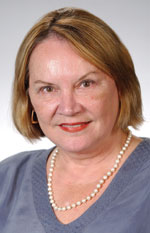 Law professor Dinah Shelton is the first woman nominated by the United States to serve on the Inter-American Human Rights Commission in its 50-year history.
Law professor Dinah Shelton is the first woman nominated by the United States to serve on the Inter-American Human Rights Commission in its 50-year history.
Shelton, a leader in international human rights law, a champion of environmental causes, and a model woman researcher and scholar in a male-dominated field, was elected to the commission on June 4 by the General Assembly of the Organization of American States during its session in San Pedro Sula, Honduras.
The seven-expert commission is an independent branch of the 34-member Organization of American States, which unites Western Hemisphere nations to strengthen cooperation on democratic values, defend common interests, and debate the major issues facing the region and the world. Based in Washington, D.C., the Human Rights Commission was created in 1959 to defend human rights in member states.
Earlier this year, the State Department recommended Shelton for nomination, and she joined a pool of commission candidates chosen by their respective countries. Five countries nominated experts for the three available committee slots, which were also filled by Rodrigo Escobar Gil of Colombia and José de Jesús Orozco Henríquez of Mexico.
To help boost her elective appeal, Shelton met with representatives from various countries, visited embassies, and gathered with human rights non-governmental organizations, plus people in the field. “It is a process of getting known and responding to concerns of governments and civil society,” Shelton says.
Shelton’s four-year term begins January 2010, when she’ll join the commission for its two-week meetings, three times a year. During the part-time position, she’ll continue her work at GW Law. As a commissioner, she will hear complaints of human rights violations, litigate cases before the Inter-American Court, and undertake studies on human rights issues in the hemisphere.
Shelton is the first Manatt/Ahn Professor of International Law, a new chair created last year by Charles Manatt and the Ahn family, who have a strong interest in international law. Shelton joined the Law School faculty in 2004 and has a long history intertwined with her legal passion.
Shelton first became interested in human rights and international law during her junior year in college while abroad in Edinburgh, Scotland.
“It was a period of great intense debate within Britain. Rhodesia had unilaterally declared independence with an apartheid regime like in South Africa, and there was a huge discussion of human rights at the time.
“I took an international law course, and then years later, I was looking through my diary, and I had written, ‘This is what I’m going to do for the rest of my life,’” she recalls.
Since that epiphany, Shelton’s focus has been on the international rule of law.
“I’m interested in trying to improve efficiency and efficacy of international monitoring systems of human rights,” she says. Her credentials for the commission position include serving as director of the doctoral program in international human rights law at the University of Notre Dame Law School, plus teaching at some eight other schools. She wrote and edited award-winning books on international law and was recently nominated to be vice president of the American Society of International Law.
Winner of the prestigious Elizabeth Haub Prize in Environmental Law in 2006, Shelton also spent two years as the director of the Office of Staff Attorneys at the U.S. Court of Appeals for the 9th Circuit and served as a legal consultant to the United Nations Environment Programme.
—CM
Panic of 2008 Conference
As the nation’s economy collapsed into recession, GW Law School brought together experts from a variety of fields to discuss the causes, consequences, and proposals for reform during a conference April 3 and 4.
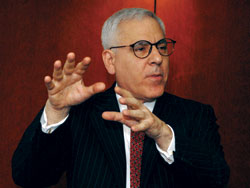
David M. Rubenstein, founder and chairman of the Carlyle Group, delivered the 28th annual Manuel F. Cohen Memorial Lecture to kick off the two-day conference.
Claire Duggan
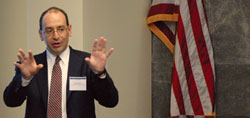
Professor Frank Partnoy of the University of San Diego School of Law spoke on one of two panels about financial regulation and accounting. In a Wall Street Journal article the next month, Partnoy said the conference was “the best academic conference to date on the financial crisis.”
Claire Duggan
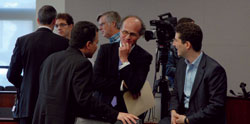
Professor Lawrence E. Mitchell (center) speaks with professor Jeffrey Rosen (left) and Dennis K. Berman, deputy bureau chief of money and finance for the Wall Street Journal, following the final panel of the conference. Mitchell was the principle coordinator of the conference, together with Arthur Wilmarth, Lawrence Cunningham, Theresa Gabaldon, and Susan Karamanian. Watch C-SPAN coverage of “Roundtable on the Significance of the Panic” at www.law.gwu.edu/News.
Claire Duggan
|
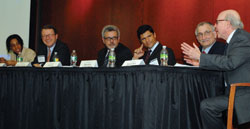
The conference began with a “Historical Context” panel featuring (from left) GW Law professor Lisa Fairfax; Robert F. Bruner, dean of the University of Virginia School of Business; economics professor Kenneth A. Snowden Jr. of the University of North Carolina, Greensboro; Sean D. Carr, director of the Batten Institute of Corporate Innovation Programs at the University of Virginia; Maury Klein, professor emeritus of history at the University of Rhode Island; and Richard Sylla, Henry Kaufman Professor of the History of Financial Institutions and Markets at New York University.
Claire Duggan
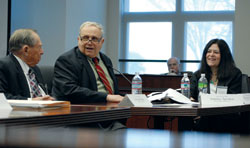
Irving Meyer Pollack, of counsel at Fulbright and Jaworski, former commissioner and director of the Divisions of Enforcement and Market Regulation for the SEC; Stanley J. Sporkin, former judge of the U.S. District Court for the District of Columbia, former Division of Enforcement, SEC; and Theresa A. Gabaldon, Lyle T. Alverson Professor of Law at GW Law School, spoke about securities regulation reform.
Claire Duggan
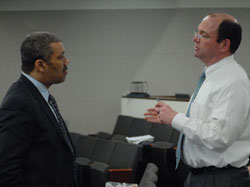
2L Myron York and Professorial Lecturer in Law John Buchman, vice president, general counsel, and corporate secretary of ETRADE Bank, talk between panels.
Claire Duggan
|
Students Serve in D.C. Attorney General Office
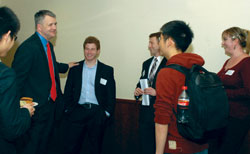
Rob Hildum, deputy attorney general of the Public Safety Division, (left) was one of several D.C. Office of the Attorney General attorneys who came to GW Law to meet with rising second and third-year law students looking to spend the summer working in the OAG.
Claire Duggan
The District of Columbia’s Office of the Attorney General and GW Law School announced a unique partnership this spring that provides law students with an opportunity to gain valuable public service and legal experience working on real-life cases and issues.
The OAG Summer Associate Program has been in place for several years and is designed to provide law students with a challenging legal experience that reflects the demands and rewards of public service, as well as a program focused on legal research and writing. This year, D.C. Attorney General Peter J. Nickles expanded the program and partnered with GW Law to recruit 40 law students for the summer. This new partnership does not end after the summer—the OAG plans to have more students from GW Law’s Outside Placement Program serve in externships during the school year as well.
Summer associates are working on a variety of legal issues within the office’s 10 major divisions: Child Support Services, Civil Litigation, Commercial, Family Services, Health and Human Services, Legal Counsel (for the mayor’s office and administrative agencies), Personnel, Labor and Employment, Public Safety, Support Services, and the Office of the Solicitor General. The law students will spend eight weeks in their legal externships, assisting in preparing cases for trial, drafting motions and legal memorandums, drafting regulations, attending mediations and arbitrations, meeting with agency clients, and otherwise providing support to the practice group.
“This is a great example of why it is so great to study law at GW and in Washington, D.C.,” says Dean Frederick M. Lawrence. “Opportunities like these that are available in our Outside Placement Program provide students with experience that can be gained nowhere else.”
GW Law students get credit for their externships but are not paid. They are required to attend a weekly class at GW Law taught by Outside Placement Program faculty members that is tailored to provide assistance to them in their positions. The OAG Summer Associates Program includes a variety of social activities and speaking programs designed to allow members to become acquainted in less formal settings and hear from experts addressing legal issues that affect the District of Columbia.
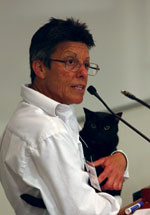
Professor Joan Schaffner and GW Animal Law mascot Spirit the cat welcome the 300 conference participants.
Anne Wernikoff
Animal Law Conference
GW Law teamed up with the No Kill Advocacy Center and other organizations this spring to bring together the nation’s most successful shelter directors and the nation’s top animal lawyers to educate more than 300 people in the field of animal sheltering.
Conference attendees learned from animal control and shelter directors who are saving more than 90 percent of all animals using the building blocks to No Kill success—programs and services that have had results in both urban and rural communities—to increase adoptions, reduce length of stay, increase redemption rates, rehabilitate animals, and more. The participants also heard from animal law experts who have challenged the legal system to help save animals, using model laws, fighting breed specific legislation, eliminating the gas chamber, filing impact legislation, and protecting condemned dogs.
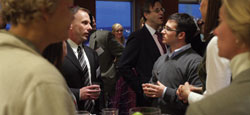
Anne Wernikoff
Diversity in the Workforce
For the second consecutive year, the career development office and Lambda Law teamed up to host a reception to highlight lesbian, gay, bisexual, and transgender diversity at law firms. More than 20 firms co-sponsored the event, including rainbow and purple-level sponsors Covington and Burling, Fried Frank, and Akin Gump. More than 100 attorneys and 1L students attended the meet and greet at GW’s City View Room.
NCMA World Congress Awards
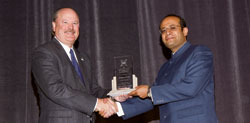
Sandeep Verma, LLM ’09, receives first prize in the W. Gregor Macfarlan Excellence in Contract Management Research and Writing Program. In addition to receiving a $5,000 award, he presented his paper on offsets in defense procurement at the National Contract Manangement Associations World Congress in Long Beach, Calif. Verma, a member of India’s civil service, also received the Thelma Weaver Memorial Award, which is given to a foreign student member of the graduating Master of Laws class who has contributed most to the intellectual and professional life of the Law School, its students, and its faculty.
Ambience Photography
|
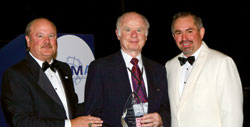
Emeritus professor Ralph Clarke Nash Jr., JD ’57, receives the Lifetime Achievement Award from the National Contract Management Association at the NCMA World Congress in Long Beach, Calif. The awards dinner, held at the Long Beach Aquarium, was attended by 800 contracts professionals.
Nash, who created the Law School’s Government Procurement Law program in 1960, served on the Law School faculty for more than 30 years. He and his colleague and co-author, John Cibinic Jr., JD ’60, were prolific authors and established GW Law School as the intellectual center of government procurement law. In 2002, Nash and Cibinic jointly received the Law School Distinguished Alumni Award. The Law School also established the Nash and Cibinic Government Contracting Industry Chair to permanently recognize their contributions to the field of law and the Law School.
Ambience Photography
|
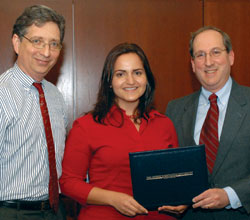
Professor Ralph G. Steinhardt, 2L Oliya Samad Zamaray, and Dean Frederick Lawrence
Student Group Recognized
Professor Ralph G. Steinhardt and Dean Frederick M. Lawrence present 2L Oliya Samad Zamaray and the International Law Society with the award for best student group event of the year. The ILS won for its “International Law Week” that brought several panel lectures and social events to GW Law and also included private tours of the Supreme Court and U.S. Department of State and various events at the embassies of France, Finland, Ukraine, and Bulgaria.
French Law Book Details Scandal
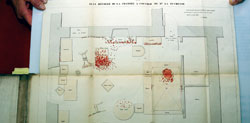
This 1847 crime scene rendering from the book Procédure shows the aftermath of the brutal murder of the Duchesse de Praslin. Read more about the Law Library’s French Collection on page 42.
Members of the GW community gathered in May during National Library Week to hear Jennie Meade, director of special collections at the Jacob Burns Law Library, tell tales of murder and nobility in the true crime story of the 1847 Paris society murder, L’Affaire Praslin.
Detailed in a French antiquarian law book purchased at a 2001 London auction, L’Affaire Praslin served as a catalyst for the Revolution of 1848 in France and has since provided juicy material for novels and the silver screen. The unassuming book, with a plain red cover and simply titled Procédure, contains a large folding diagram, depicting the grisly beating and stabbing of the Duchesse de Praslin by her husband, the Duc.
“It’s an innocuous designation for a book of primary materials documenting perhaps the strangest, and most sensational, officially unsolved murder of 19th-century France,” Meade says.
The Duc, a descendant of French nobility, and the Duchesse, the daughter of one of Napoleon’s generals, were prominent figures of French high society, making the murder all the more shocking.
While an exact motive remains unknown, the combination of an unraveling marriage and a charming governess, Henriette Deluzy, spelled disaster for the noble couple. The Duchesse became increasingly emotionally fragile in response to rumors that the Duc was engaged in a love affair with the governess. The Duchesse fired the governess. One month later, on Aug.18, 1847, the Duchesse was dead.
Though the Duc denied involvement in the murder, blaming an alleged intruder, authorities discovered him washing and burning blood-stained clothing shortly after the deed had been committed. Six days after the Duchesse’s death, and before the Duc would stand trial, he poisoned himself with arsenic. The case was extinguished by the Court of Peers, and the murder remains officially unsolved.
The book contains certified documents from the Court of Peers and includes the interrogation of the Duc and governess, the autopsy report, depositions, and letters. The book’s diagram, bespeckled with red paint representing blood, illustrates “a hideous struggle to the death.” “It was the official story of the case,” Meade says.
As word of the scandal spread throughout France, the people’s distaste for French aristocracy grew. The murder served as the tipping point for the Revolution of 1848 in France, which brought down the July Monarchy.
“It gave important insights into how French society and history has evolved,” says Ann McClellan, director of communications for the Law School Development Office, who attended the event. “It’s interesting to think about how the world was changing.”
The piece marks another noteworthy addition to the library’s award-winning French Collection. Presently one of the largest collections of French historical legal materials in the United States, the collection focuses on coutume, or customary law, which formed the basis for early French law. More than 16,000 works dating from the 15th to 19th centuries comprise the Law Library’s special collections.
Meade says Procédure was an unexpected find among books purchased in a lot and “provides an example of how serendipity operates in collection development, and how worlds connect at our library.”
—Alexa Zenzano, JD ’07
Competition Law
The GW Competition Law Center, under the leadership of professor Edward T. Swaine, hosted two major conferences this spring semester with the goal of promoting discussion among policymakers, practitioners, and academics from the United States and abroad on new policy initiatives relating to private enforcement, emerging experience, and new research initiatives. The first, titled “Private Enforcement of Competition Law: New Directions,” was held in February, and the second, “More Common Ground for International Competition?” was in June.
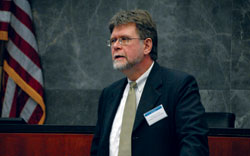
Federal Trade Commissioner and GW Law professor William E. Kovacic, a speaker at the February conference
|
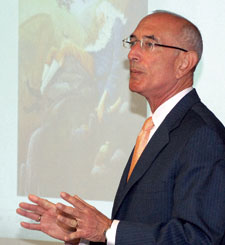
February conference speaker Michael D. Hausfeld, JD ’69, helped establish the GW Competition Law Center.
|
Symposium Investigates Greenhouse Gas Reductions
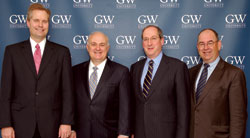
Keynote Graham M. Pugh, senior policy analyst at the U.S. Department of Energy; GW President Steven Knapp; GW Law School Dean Frederick M. Lawrence; and Lee Paddock, associate dean for environmental law studies
Jessica McConnell
On April 15, the Law School joined with the University to host a symposium on “Accelerating Greenhouse Gas Reductions,” co-sponsored by Troutman Saunders and the American Coalition for Clean Coal Electricity. The program explored the technology, public policy, and legal issues related to greenhouse gas reductions that could be achieved through carbon capture and storage, more rapid commercialization of solar energy, and next generation personal transportation systems. GW Law School Dean Frederick M. Lawrence and GW President Steven Knapp opened the symposium, followed by keynote speaker Graham M. Pugh, senior policy analyst at the Climate Change Policy and Technology, Office of Policy and International Affairs, U.S. Department of Energy.
Other speakers, panelists, and audience members included representatives from the U.S. Department of Energy, the U.S. Environmental Protection Agency, the Pew Center on Global Climate Change, Carnegie Mellon University, the World Resources Institute, Troutman Saunders, the University of Michigan SMART Program, Edison Electric Institute, Toyota Motor North America, General Motors, the Automobile Alliance, and the GW faculty. Lee Paddock, associate dean for environmental law studies at GW Law, planned the symposium, working closely with Managing Partner Kevin Fitzgerald, BA ’85, MA ’88, JD ’91, and his colleagues at Troutman Saunders.
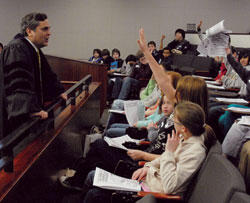
“Judge” Jonathan Turley takes questions from the
student jurors.
Claire Duggan
Big Bad Wolf Trial
For the second year, Jonathan Turley, J.B. and Maurice Shapiro Professor of Public Interest Law, and more than a dozen students spent a day during spring break teaching civics to elementary school students from Kent Gardens in McLean, Va. The children had a lesson in forensics followed by a simulation of a trial based on the story of The Three Little Pigs.
This spring, Turley joined such luminaries as retired Justice Sandra Day O’Connor on the board of directors of Citizenship Counts, a nonpartisan, nonprofit organization dedicated to improving civics education by actively engaging America’s youth and the greater community in the democratic process.
To read more about the Big Bad Wolf Mock Trial, read “Trying Pig Tales” at www.abajournal.com/magazine/trying_pig_tales.
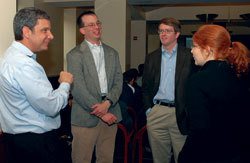
Robert G. Sterne of Sterne, Kessler, Goldstein & Fox, gave a talk during a benefactors lunch titled “Optimized Reexamination Strategies.” (From left) Sterne with professors Michael Abramowicz, John Duffy, and Sarah Rajec.
Claire Duggan
Five New Benefactors Support IP at GW
GW’s IP Benefactors make a significant contribution to the School’s Intellectual Property Program. The Benefactors Program comprises IP corporations and law firms, which each designate a member to serve on the School’s IP Advisory Board and provide counsel on the development of the academic program. This year, Intel further strengthened its relationship with GW Law by becoming the first corporate member of the Benefactors Program. Four new law firms also recently joined the ranks of IP Benefactors, which includes: Howrey; Intel Corp.; Kenyon & Kenyon; Latham & Watkins; Lowe Hauptman Ham & Berner; Ropes & Gray; Rothwell, Figg, Ernst & Manbeck; Sterne, Kessler, Goldstein & Fox; and the Bureau of National Affairs Inc.






 Law School rolled out the welcome mat this spring for its sixth national law journal as the Federal Circuit Bar Journal moved to its new home at the Law School. The widely-read scholarly publication, focusing on substantive and procedural law, is published quarterly and boasts a subscriber base of more than 3,000 judges, professors, attorneys, and law students.
Law School rolled out the welcome mat this spring for its sixth national law journal as the Federal Circuit Bar Journal moved to its new home at the Law School. The widely-read scholarly publication, focusing on substantive and procedural law, is published quarterly and boasts a subscriber base of more than 3,000 judges, professors, attorneys, and law students. 
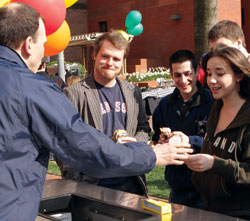




 Law professor Dinah Shelton is the first woman nominated by the United States to serve on the Inter-American Human Rights Commission in its 50-year history.
Law professor Dinah Shelton is the first woman nominated by the United States to serve on the Inter-American Human Rights Commission in its 50-year history.
















